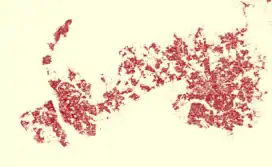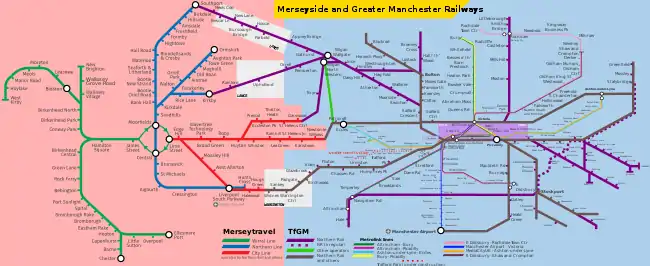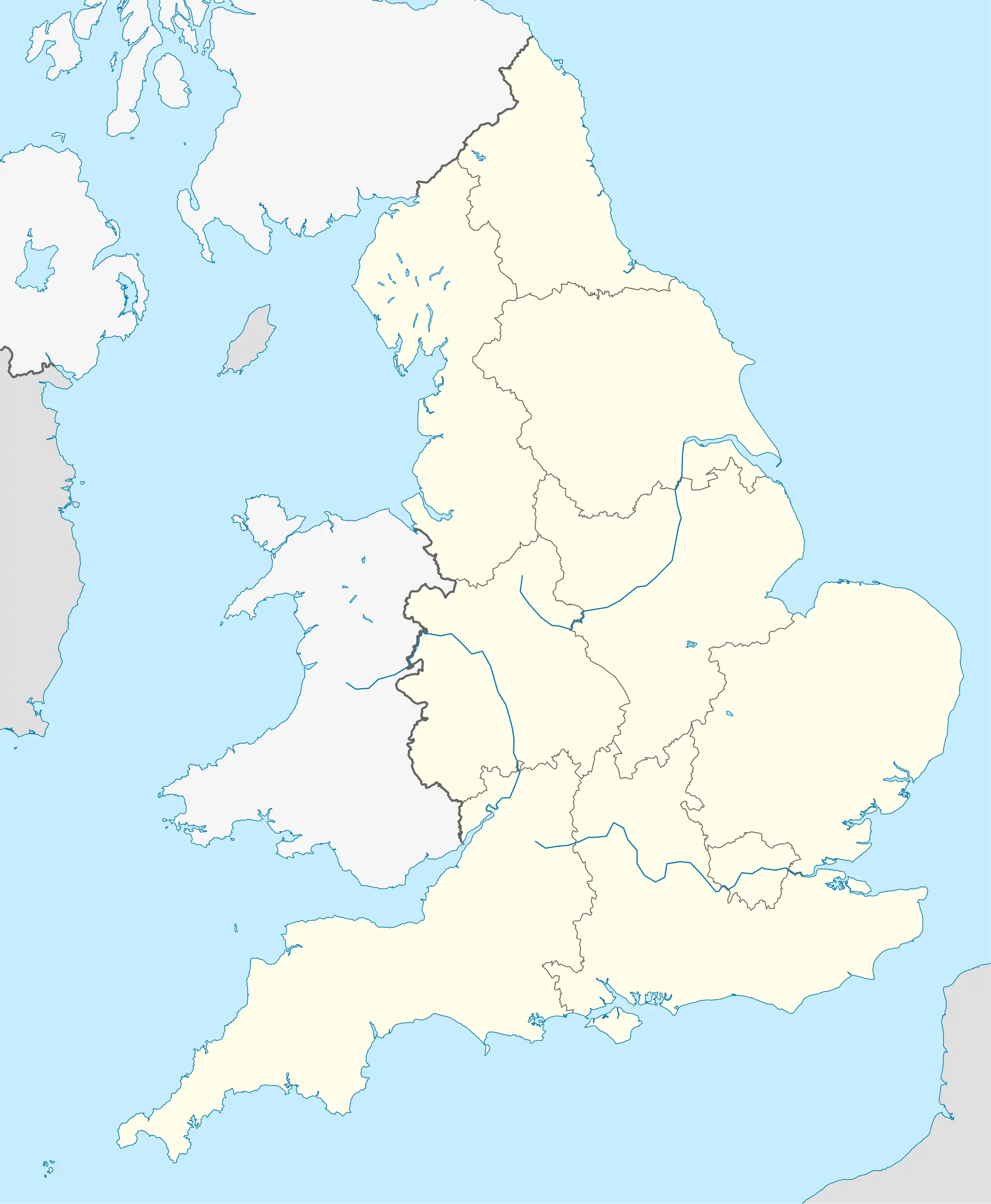Liverpool–Manchester Megalopolis
The two cities of Liverpool and Manchester, some 35 miles (56 km) apart in North West England, are connected in many ways, but also have a historic rivalry in sporting and other senses. The cities are sometimes considered parts of a large polynuclear metropolitan area[1][2] or megalopolis.[3] The total population of the area is over 5.6 million.[4]
The region is separated from the West Yorkshire Urban Area and the Sheffield Urban Area, by the Peak District and is close to the Rossendale urban area,[5] the Accrington Urban Area near Blackburn and Burnley and the Preston Urban Area. The short distance between the areas make some consider them part of the Liverpool-Manchester megalopolis.

History
Industrialisation
Exponential growth and a combined economy has its beginnings during the Victorian era, when both cities underwent substantial industrialisation. The Liverpool and Manchester Railway in 1830 was a key achievement, and was the world's first inter-city railway,[6] it was also the first railway to rely exclusively on locomotives driven by steam power, with no horse-drawn traffic permitted at any time; the first to be entirely double track throughout its length; the first to have a signalling system; the first to be fully timetabled; and the first to carry mail.[7]
Trains were hauled by company steam locomotives between the two towns, though private wagons and carriages were allowed. Cable haulage of freight trains was down the steeply-graded 1.26-mile (2.03 km) Wapping Tunnel to Liverpool Docks from Edge Hill junction. The railway was primarily built to provide faster transport of raw materials, finished goods and passengers between the Port of Liverpool and the cotton mills and factories of Manchester and surrounding towns.
Designed and built by George Stephenson, the line was financially successful, and influenced the development of railways across Britain in the 1830s. In 1845 the railway was absorbed by its principal business partner, the Grand Junction Railway (GJR), which in turn amalgamated the following year with the London and Birmingham Railway and the Manchester and Birmingham Railway to form the London and North Western Railway.[8]

Manchester Ship Canal
Relations between the cities turned bitter after the construction of the Manchester Ship Canal in 1894 by Manchester merchants. The Mancunian merchants became disenchanted with the dues they had to pay to import and export goods to and from Manchester. Consequently, they decided to build a ship canal, which was the largest ship canal in the world upon opening in 1894.
Road
In 1976 the M62 motorway at the Liverpool end was completed and opened, connecting Liverpool to Manchester by one motorway.
Rivalry
The Liverpool–Manchester rivalry is a rivalry that exists between the English cities of Manchester and Liverpool. The cities have many similarities and differences, which have intensified the rivalry, and both lie at the heart of North West England — the most populated region outside of the Greater London area in the United Kingdom.[9]
The rivalry is generally agreed to have ignited after the construction of the Manchester Ship Canal. Manchester merchants became disenchanted with the level of dues they had to pay to export and import their goods. Consequently, the Mancunian merchants decided to construct a ship canal. The Ship Canal would become the largest in the world upon opening in January 1894 and highlighted the length the merchants were prepared to take to avoid paying dues.[10]
Both cities remain rivals, but with a relationship that is steadily improving; natives of both cities have cited a belief that keeping Liverpool and Manchester strong is in the best interests of the whole North West. In 2011, the Financial Times stated that the North West economy—led by the redevelopment of both cities—is a formidable rival to that of "overheated London".[11] Manchester openly supported Liverpool in its years-long bid to become the European Capital of Culture,[12][13] which it finally achieved in 2008 and which would come to be credited with massively reviving the city and its reputation.
Rivalry in football
A notable rivalry exists between the football clubs and supporters of Everton, Liverpool, Manchester City and Manchester United.
Liverpool vs Manchester United
The rivalry between Liverpool and United supporters is fierce and considered the biggest regional football rivalry in England. This is partly due to the fact that Manchester United and Liverpool have dominated the English game and are the country's two most successful clubs.
Liverpool vs Manchester City
Liverpool and Manchester City have a newer and growing rivalry that began in the Premier League in the early 2010s, with the rivalry intensifying as the decade progressed.[14] The two clubs competed against each other in the top four in the 2016-17 season. They competed in the Quarter-final in UEFA Champions League in 2017–18, when Liverpool saw off Manchester City. The competed at the top two for the Premier League title for a few times, first in 2013-14 and more recently the historic 2018-19 season,[15] in which both clubs finish with 97 and 98 points respectively (at least 25 above the other clubs), having attempted to one-up against each other throughout the mid-season until the final match of the season, when Manchester City ultimately won the title after defeating Brighton with a 4-1 scoreline.[16] They competed at the top two again in 2019-20 season, with Liverpool finally winning this time.
Everton vs Manchester United
A significant rivalry dating back to the 1960s, the two have met in two FA Cup finals that both ended in shock wins. A ten-man Manchester United stopping newly crowned League and European Cup Winners' Cup champions Everton 1–0 in 1985. A decade later a mid-table Everton beat a dominant United 1–0 in 1995 with a spirited defensive display. Crowd trouble has often marred fixtures, a 2005 FA Cup game at Goodison Park was described as the "worst football related violence seen in Liverpool" by Merseyside Police.[17]
FA Cup Finals between the cities' teams
| Season | Winners[18] | Score[18] | Runners–up[18] | Venue[19] | Attendance[19] |
|---|---|---|---|---|---|
| 1932–33 | Everton | 3–0 | Manchester City | Wembley Stadium (original) | 92,950 |
| 1976–77 | Manchester United | 2–1 | Liverpool | Wembley Stadium (original) | 100,000 |
| 1984–85 | Manchester United | 1–0 (aet)* | Everton | Wembley Stadium (original) | 100,000 |
| 1994–95 | Everton | 1–0 | Manchester United | Wembley Stadium (original) | 79,592 |
| 1995–96 | Manchester United | 1–0 | Liverpool | Wembley Stadium (original) | 79,007 |
See also
References
- Bäing, Andreas Schulze. "Shrinking cities and growing regions ? emerging trends of new rural-urban relationships in the UK and Germany". www.escholar.manchester.ac.uk.
- "World Gazetteer: United Kingdom - largest cities (per geographical en…". world-gazetteer.com. 5 January 2013. Archived from the original on 5 January 2013.
- Stockdale, David. "Achieving Equality of Service Provision across the North West" (PDF). The MS Society. Archived from the original (PDF) on 2011-11-27. Retrieved 2011-11-27.
- Schulze Bäing, Andreas. "Shrinking cities and growing regions – emerging trends of new rural-urban relationships in the UK and Germany". 13 July. AESOP University of Manchester. Retrieved 19 March 2015.
- Census 2001 Key Statistics, Urban areas in England and Wales, See part 8
- "Manchester to Liverpool: the first inter-city railway". BBC News. Retrieved 1 July 2019.
- Jarvis 2007, p. 20.
- Thomas 1980, p. 107.
- "Scouse v Manc". BBC.co.uk. 21 August 2007.
- "1 January 1894: Opening of the Manchester ship canal". The Guardian. 1 January 1894. Retrieved 2012-03-13.
- "Living in the North West". AstraZeneca. Archived from the original on 2011-10-26. Retrieved 2011-09-20.
- "'Rival' city supports culture bid". BBC. 10 March 2003. Retrieved 2011-09-13.
- "City sends rival Valentines card". BBC. 14 February 2003. Retrieved 2011-09-13.
- Nalton, James. "Liverpool Versus Manchester City: A Rivalry Renewed Sets Tone For New Season". Forbes. Retrieved 2019-09-26.
- McCauley, Kim (2019-08-06). "Manchester City and Liverpool are building a rivalry the Premier League has been missing". SBNation.com. Retrieved 2019-09-26.
- "Liverpool vs Manchester City: The next big rivalry in English football?". www.sportskeeda.com. 2019-01-05. Retrieved 2019-09-26.
- "The battle of Everton Valley". www.liverpoolecho.com. 2005-02-21. Retrieved 2020-07-19.
- "F A Cup Summary – Contents". The Football Club History Database. Retrieved 4 November 2008.
- Barnes, Stuart (2008). Nationwide Football Annual 2008–2009. SportsBooks Ltd. pp. 132, 134–143. ISBN 1-899807-72-1.
